|
|
|
Sort Order |
|
|
|
Items / Page
|
|
|
|
|
|
|
| Srl | Item |
| 1 |
ID:
129835
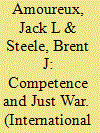

|
|
|
|
|
| Publication |
2014.
|
| Summary/Abstract |
This article argues that the Just War tradition would do well to consider the importance of competence - and that doing so would invigorate debates about the use of organized violence. The article defends this argument through several moves. First, inspired by Aristotle's thoughts on phronesis and chance, we view competence as a practice among those who, as a matter of course, engage in practical reasoning that takes into account the contingency of political action. Second, following from Arendt, competence can be considered that which foregrounds means over ends. Third, because competence is a continuous and more vigilant consideration of justice within war, it extends through both jus ad bellum and jus in bello principles, including the 'proper authority' and 'reasonable chance for success' conditions of the former, and the 'double effect' doctrine discussed in the latter. The article concludes by acknowledging the challenges presented by an overemphasis on competence, before ultimately restating its purchase for Just War debates in the twenty-first century.
|
|
|
|
|
|
|
|
|
|
|
|
|
|
|
|
| 2 |
ID:
113138
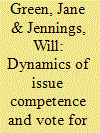

|
|
|
|
|
| Publication |
2012.
|
| Summary/Abstract |
This article develops the reward-punishment issue model of voting using a newly collated aggregate measure of issue competence in Britain between 1971 and 1997, revealing systematic differences between governing and opposition parties in the way citizens' evaluations of party competence are related to vote intention. Using monthly Gallup 'best party to handle the most important problem' and vote intention data, time series Granger-causation tests give support to a classic issue reward-punishment model for incumbents. However, for opposition parties this reward-punishment model does not hold: macro-issue competence evaluations are Granger-caused by changes in vote choice or governing party competence. An explanation is offered based upon the differentiating role of policy performance and informational asymmetries, and the implications are considered for comparative studies of voting, public opinion and for political party competition.
|
|
|
|
|
|
|
|
|
|
|
|
|
|
|
|
| 3 |
ID:
166439
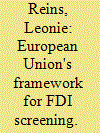

|
|
|
|
|
| Summary/Abstract |
The European Commission recently released a proposal for a Regulation establishing a framework for screening of foreign investment into the European Union. The proposal aims at introducing a harmonized regulatory framework for the screening of foreign direct investments by Member States on grounds of security or public order, amongst others in the energy sector. The proposal seems to be catered towards deference for Member States, but considering the large amount of EU funding involved, as well as the applicability of EU legislation, in practice many projects will fall under the new screening competence of the Commission. Even though the Commission, according to the proposal, may only give an opinion, it appears to turn the energy competence ever more towards Brussels. This paper aims at determining how the screening mechanism should be seen in light of EU competences in the area of investment and energy. Is this an example of “mission creep” on the part of the Commission? Does this infringe Article 194 TFEU which guarantees the Member States' “right to determine the conditions for exploiting its energy resources, its choice between different energy sources and the general structure of its energy supply”? Or is this justified and needed action on the basis of the Article 170 TFEU on trans-European networks in the area of energy infrastructure?
|
|
|
|
|
|
|
|
|
|
|
|
|
|
|
|
| 4 |
ID:
153301
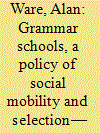

|
|
|
|
|
| Summary/Abstract |
Initially, four plausible reasons for introducing selection in secondary education are examined, three of which are irrelevant to contemporary debates about expanding grammar-school education. These are: first, to ration education in less advanced economies; second, to increase the supply of skilled labour within an expanded national elite; third, as part of a ‘segmented’ system of education. A fourth—increasing upward social mobility—is open to two objections: first, the May government's proposals are so limited as to have little likely impact on mobility and, second, upward mobility in the twentieth century was possible only because of structural change in the British labour market, and that will probably not continue in this century. Finally, it is argued that attempts to select the ‘best’ in any activity or skill are necessarily highly imperfect, and are far less accurate than testing who does and does not meet some minimum level of competence.
|
|
|
|
|
|
|
|
|
|
|
|
|
|
|
|
| 5 |
ID:
127414
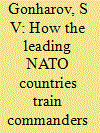

|
|
|
|
|
| Publication |
2013.
|
| Summary/Abstract |
The author discusses the principal areas, content, methods, and organization of commander training in the world's leading countries in managing subordinates' morale and psychology. He also addresses the requirements that apply to foreign military leaders' competence in psychology and pedagogy, and examines the ways in which they are applied in military educational institutions and in actual military service.
|
|
|
|
|
|
|
|
|
|
|
|
|
|
|
|
| 6 |
ID:
186940
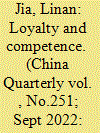

|
|
|
|
|
| Summary/Abstract |
Scholarly debate on the role of various contributing factors in cadre promotion yields conflicting evidence for different administrative levels in China, yet rarely has any quantitative evidence been presented for below the county level. This study explores the causal relationship between loyalty, competence and promotion at the township level. Based on an original dataset of local cadre training records, this paper utilizes cadres’ training experience at Party schools and academic institutions to account for loyalty and competence at the local level. Using a rigorous data-preprocessing method – coarsened exact matching (CEM) – this paper explores the causal effects of cadre training on promotion. The empirical results show that Party school training significantly increases the probability of promotion for township-level cadres, while university training contributes to chances of promotion to a lesser but indispensable degree. Moreover, local cadres who are both Party school and university trained enjoy the best chances of promotion.
|
|
|
|
|
|
|
|
|
|
|
|
|
|
|
|
| 7 |
ID:
153751


|
|
|
|
|
| Summary/Abstract |
The paper analyzes the foreign practice of CALS (Continuous Acquisition and Lifecycle Support) contracts. It offers a conceptual model of controlling the life cycle of products, which is to include the professional training of communication combat unit personnel of Navy surface ships (SS). It recommends creating a virtual learning environment for Navy specialists when taking up end-to-end lifecycle contracts. The authors conclude that these measures are necessary.
|
|
|
|
|
|
|
|
|
|
|
|
|
|
|
|
| 8 |
ID:
138871
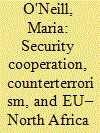

|
|
|
|
|
| Summary/Abstract |
The EU is clearly in the process of developing an external dimension to the Area of Freedom, Security and Justice (AFSJ). This paper focuses on ex. Police and Judicial Cooperation in Criminal Matters (PJCCM) provisions. These developments pose specific legal basis issues for the EU, given its complex EU–member state legal relationship, and the inter-institutional balance, all reflected in the treaty framework post-Lisbon. New Court of Justice rulings are now emerging which will assist in this issue. Equally the approach to be taken in developing these relationships will be crucial. This paper proposes the adoption of an Onuf style constructivism in order to best capture the reality of the process that is developing, and has developed for the ex. PJCCM measures internally. This then needs to be allied with a constitutionalism model to ensure a balanced development of all three aspects of the AFSJ.
|
|
|
|
|
|
|
|
|
|
|
|
|
|
|
|
| 9 |
ID:
104082
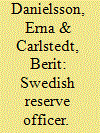

|
|
|
|
|
| Publication |
2011.
|
| Summary/Abstract |
The aim of this study is to examine the reserve force's role in and contribution to the new Swedish expeditionary armed forces. Survey data were obtained from 418 reservists. The results show that reserve officers are well educated and hold high positions in the civil society. According to the reserve officers themselves, the Armed Forces do not ask for their nonmilitary competence. The discontent with this situation is greater among the younger reservists as opposed to the older ones. Four different opinions on the need for the reserve officers are suggested. First, reserve officers are requested to fill vacancies, that is, a volume regulator. Second, the reserve officers are needed because they have unique competences other than military that are used by the armed forces. Third, reserve officers are needed from an economic point of view. Finally, reserve officers contribute to the civil-military relationship. However, when using a framework intended for regular officers, the contribution of the reserve officers' civil professional competence has not been recognized.
|
|
|
|
|
|
|
|
|
|
|
|
|
|
|
|
|
|
|
|
|